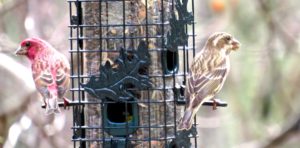This year will mark the 117th annual Audubon Christmas Bird Count (CBC.) The CBC is the longest-lived and largest citizen-science project in the world. The count began in 1900. It was the brainchild of Frank Chapman one of the officers of the fledgling Audubon Society. Chapman created the “bird census” as an alternative to the traditional Christmas “side-hunt,” a contest where groups would shoulder their arms and hit the fields and/or woods – the team that came back with the greatest number of corpses would be declared the winner.
Chapman’s endeavor on that Christmas Day back in 1900 included 27 participants who conducted 25 CBCs. A total of around 90 species of birds were recorded.
The 116th CBC included 76,669 individuals participating in 2,505 CBCs. Counters tallied 58,878,071 birds representing 2,607 different species – about one-fourth of the world’s known bird species. There were 1,902 counts in the U.S., 471 in Canada plus another 132 in Latin America, Bermuda, the Caribbean and the Pacific Islands.
There will not be 75,000 bespectacled scientists in white lab coats followed by their statisticians evaluating and recording all the species observed afield. There will be you and me and some birders better than us, and some birders not so good. Not every birder participating in a CBC will be able to differentiate between a female sharp-shinned hawk and a male Cooper’s hawk. But 99 percent of participants do know what a robin looks like and a cardinal and a chickadee and most can count. The science is not pristine, but the data is invaluable.
More than 200 peer-reviewed studies have been published that include CBC data. Audubon’s “2014 Climate Change Report” relied heavily on CBC data, as did the EPA’s 2012 report on climate change. The U.S. Fish & Wildlife Service’s “State of the Birds 2009” also incorporated much CBC data.
The Patuxent Wildlife Research Center, which has joined with Audubon to make CBC data more relevant and more accessible recently noted, “The CBC’s current relevance is as a comparative historical source of information on bird changes, a coarse means of capturing large bird changes, and a conservation-oriented recreational pursuit by birders. There are better ways of measuring changes in wintering bird populations. On the other hand, since the CBC system is already in place at no cost to anyone but those who participate and over long periods of time interesting trends are documented, the running of CBC’s by birders should not be discouraged.” In other words, you’re doing good – keep it up.
The Carolina Field Birders will be conducting our 13th annual CBC (we began in 2001 but one year was cancelled due to snow and ice and treacherous roads) on December 30. Anyone interested in participating should contact me at ddihen1@bellsout.net or by phone at 828.646.0871.
We generally start between 7 and 7:30 a.m. and knock off around 5 p.m. The count is followed by an “after-count” tally at Bocelli’s. All participants and their families are invited to the tally where we count the day’s species.

